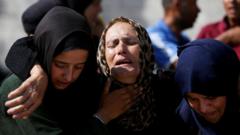"In the escalating conflict between Ukraine and Russia, troops in Sumy's northeastern region endure nightly drone attacks from Iran-made Shahed drones. Utilizing World War I-era weapons, these local defenders, led by a former forest ranger, experience an overwhelming sense of monotony and despair as they confront the relentless assaults. Meanwhile, the devastating consequences of war touch civilians like Margaryta, who recounts a tragic drone strike that cost her family dearly."
"Endless Skies: The Nightly Battle of Ukrainian Defenders Against Drone Attacks"

"Endless Skies: The Nightly Battle of Ukrainian Defenders Against Drone Attacks"
"Ukrainian soldiers in Sumy face relentless Russian drone assaults, grappling with outdated weaponry and the emotional toll of warfare."
As darkness descended on the north-eastern region of Ukraine, a determined group of Ukrainian soldiers readied themselves for yet another night of combat against Russian drones—unseen harbingers of terror in the skies above Sumy. Night after night, these defenders emerge from the treeline, armed with heavy machine guns mounted on flatbed trucks, engaged in a hopeless struggle against about 100 Iranian-designed Shahed drones that threaten towns and cities across Ukraine, including the capital, Kyiv.
The atmosphere is heavily charged with adrenaline as the commander, codenamed Jaeger, monitors a screen filled with red dots representing incoming threats. Despite the enhancement of air defense over the months, the troops combat an enemy that has adapted and continues to overwhelm ground forces with sheer numbers. As the whirring propellers grow louder, anticipation builds, and then the familiar harmony of gunfire erupts. But more often than not, the elusive drones slip away into the night.
"We're not allowed time for emotions," Jaeger solemnly remarks, acknowledging the stark reality of warfare. Each drone intercepted offers a fleeting sigh of relief, but the relentless waves of attacks can often drown out such feelings. This "mobile fire unit" consists of local heroes, including farmers and builders, defending not just their hometown but their homeland against an insurmountable foe.
The psyche of these soldiers reflects the tragic monotony of conflict. "It's like Groundhog Day," Jaeger observes, as he speaks to the enduring uncertainty of how long the war will continue. And the emotional toll weighs heavily; relationships fracture under the strain, as families are ripped apart in place of reunions.
For many in the region, the drone warfare carries harrowing consequences. Civilians like Margaryta Husakova share their painful experiences—lives shattered after attacks claim the lives of loved ones. Margaryta lost multiple family members in a drone strike that tore through a bus, an echoing reminder of the chilling proximity of death in the face of ongoing assaults.
In the broader context of geopolitical shifts, the conflict shows few signs of resolution. Vladimir Putin's ambitions linger ominously over the region, leaving defenders bracing for protracted engagements. With daily life submerged in the undertow of destruction, the inhabitants continue to navigate a life permeated by uncertainty and fear, forever aware of the next sirens that may herald another round of violence. With each sunset, as summer's sun gives way to twilight, both soldiers and civilians in Ukraine remain on the front lines of enduring warfare, their futures cast in shadow.





















